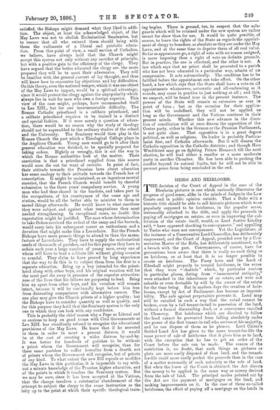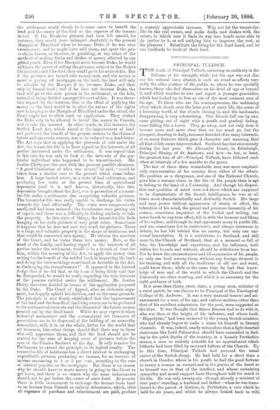HEIRS AND HEIRLOOMS.
THE decision of the Court of Appeal in the case of the Blenheim pictures is one which curiously illustrates the- progress of good sense, alike in the minds of Judges in the Law Courts and in public opinion outside. That a Duke with a historic title should be able to sell historic pictures which were popularly supposed to be heirlooms, in the popular sense, irrevocably attached to the title, and apply the proceeds in paying off mortgages on estates, or even in improving the cul- tivation of the estate itself, would, as Lord Justice Lindley said, "have appeared shocking to conveyancers," and appalling to Tories who were not conveyancers. Yet the Legislature, at the instance of a Conservative Lord Chancellor, has deliberately empowered, and the Court of Appeal, presided over by a Con- servative Master of the Rolls, has deliberately sanctioned, such a breach with the past. Conveyancers, of course, have for generations been aware that there is really no such thing as an heirloom, or at least that it is no longer possible to create an heirloom. The Pusey horn and the Luck of Edenhall might properly be termed heirlooms, in the sense that they were "chattels" which, by particular custom in particular places, dating from "immemorial antiquity," were attached to the inheritance of an estate, and were not saleable or even devisable by will by the owner of the estate for the time being. But in modern days the creation of heir- looms, except by Act of Parliament, has become an impossi- bility. The rule against perpetuities prevents it. Land may still be entailed in such a way that the entail cannot be broken, even by a full tenant-in-tail in possession of the land, without a formal disentailing deed, or a conveyance enrolled in Chancery. But heirlooms which are directed to follow the land cannot be prevented from falling absolutely under the power of the first tenant-in-tail who arrives at his majority, and he can dispose of them as he pleases. Lord Cairns's Settled Land Act has given to the mere tenant-for-life the same power of sale of heirlooms that it gives him as to land, with the exception that he has to get an order of the Court before the sale can be made. The reason of the restriction is, no doubt, that such things as pictures or plate are more easily disposed of than land, and the tenant- for-life could more easily pocket the proceeds than in the case of a matter necessarily of such notoriety as the sale of land. But when the leave of the Court is obtained, the Act directs the money to be applied in the same way as money derived from the sale of land. The principal modes pointed out by the Act are the payment of mortgages on the land, and making improvements on it. In the case of these so-called heirlooms, the effect of paying off a mortgage on the lands in
the settlement would clearly be in some cases to benefit the land and the owner of the land at the expense of the tenant- in-tail. If the Blenheim pictures had been left unsold, for instance, they would have belonged absolutely to the present Marquis of Blaudford when he became Duke, if he was over twenty-one ; and he might have sold them, and spent the pro- ceeds on horses, or theatres, or gambling, or any other of the methods of making ducks and drakes of money affected by our gilded youth. Even if the Marquis never became Duke, he would still have the power of selling the pictures, subject to the Duke's life interest ; and if he died, they would go to his next-of-kin. But if the pictures are turned into money now, and the money is spent in paying off mortgages on the land, the land will only be saleable by the Marquis if he becomes Duke, and then only by formal deed ; and if he does not become Duke, the land will go to the next person in the settlement, or the heir, instead of being divided amongst the next-of-kin. It was there- fore argued by the trustees, that as the effect of applying the money to the land would be to alter the nature of the rights now belonging to the Marquis of Blandford under the entail, the Court ought not to allow such an application. They wished the Duke only to be allowed to invest the money in Consols, and to take the interest. In other words, in this instance the Settled Land Act, which aimed at the improvement of land, and preferred the benefit of the present owners to the claims of future and uncertain owners, was to be reduced to a dead-letter. The Act says that in applying the proceeds of sale under the Act, the tenant-for-life is to have regard to the interests of all parties interested under the settlement. It was argued that in this case he was only to look at the interests of the par- ticular individual who happened to be tenant-in-tail. Mr. Justice Chitty put the case with the greatest possible clearness. "A good illustration of what was meant," he said, "could be taken from a similar case to the present which came before him. A large landed estate, in a state of bad cultivation, and producing low rents at the present time of agricultural depression (and it is well known, historically, that this depression brought about the Act), was in possession of a tenant- for-life under a settlement also comprising valuable pictures. The tenant-for-life was really unable to discharge his duties towards the land effectually. The rents were comparatively small, and had been reduced ; the farmhouses were getting out of repair, and there was a difficulty in finding anybody to take the property. In this state of things, the tenant-for-life finds hanging on his walls pictures of very great value. Sometimes it happens that he does not care very much for pictures. There is a large and valuable property in the shape of heirlooms, and that could be converted into money. He obtains the sanction of the Court, and he turns them into money. Now, as the head of the family, and having regard to the interests of all parties under the settlement, would it be a breach of trust for him, within the meaning of the Act, to apply the money thus arising for the benefit of the settled land, in improving the land, and doing the various things mentioned as desirable in the Act, as discharging the encumbrances ?" It appeared to the learned Judge that if he did that, so far from it being fairly said that he disregarded, he would be really regarding the true interests of the persons entitled under the settlement. Mr. Justice Chitty therefore decided in favour of the application proposed by the Duke. The Court of Appeal, after an elaborate argu- ment, has happily upheld his decision, and on the same grounds. The principle is now firmly established that the improvement of the land and the benefit of the living owner are to be preferred to the sentimental interests and the chances of the future owners pointed out by the dead hand. While we may regret it when historical mementoes and the accumulated art treasures of generations are to be dispersed at the bidding of an unworthy descendant, still, it is, on the whole, better for the world that art treasures, like other things, should find their way to those who will appreciate them, and that the land should not be starved for the sake of keeping acres of pictures before the eyes of the Charles Surfaces of the day. It only remains for Parliament to extend the principle to its logical results. The tenant-for-life of heirlooms has a direct interest in exchanging unprofitable pictures producing no income, for an increase of income amounting to 4 or 5 per cent., according to the rate of interest payable on the mortgages. But there is no reason why he should have to waste money in going to the Court to get leave, and there is no reason why the same inducements should not be put before the owner of mere land. At present there is little inducement to exchange the income from land to an income from Consols or railway debentures, which, after all expenses of purchase and reinvestment are paid, produce a scarcely appreciable increase. Why not let the tenant-for- life be the real owner, and make ducks and drakes with the estate, in which case it finds its way into hands more able to do justice to it, or sell outlying bits to improve the rest, at his pleasure ? Substitute the living for the dead hand, and let our landlords be lords of their land.



































 Previous page
Previous page